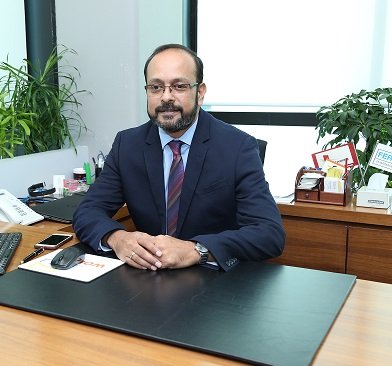Ferring will continue to launch the global research products in India
September 04, 2018 | Tuesday | Interviews
Ferring Pharmaceuticals, a pharma major from Europe, recently laid the foundation stone for their state- of-the art R&D laboratory and manufacturing facility in Hyderabad.
The company had established its Indian subsidiary in 1997 and has thus far established a manufacturing facility, an R&D centre and commercial operations in Maharashtra. The 2 billion Euro research-driven specialty biopharmaceutical group is a leader in reproductive medicine and women’s health. In line with this, the company is all set to release its heat-stable carbetocin drug in the India that is as effective as oxytocin in preventing postpartum haemorrhage (PPH). The drug is expected to hit the shelves in India in a year’s time after obtaining the approval from the Central Drugs Standard Control Organisation (CDSCO). Suresh Pattathil, Chief Executive Officer (CEO), India, Ferring Pharmaceuticals interacted with BioSpectrum recently and shared details of these recent developments. Edited excerpts-
What would be the core focus of the new R&D facility in Hyderabad? What are the plans regarding the recruitment at the new facility?
The Hyderabad project will consist of an R&D Centre, Pilot Plant, and Manufacturing facility. The current R&D facility based in Mumbai will be shifted to Hyderabad and the focus will be on formulation development which will provide more convenience and efficacy. The capital investment planned is around 235 crores for this project. After we have completed all the phases of the project we estimate around 245 people working at the facility.
What are the company’s plans regarding the launch of carbetocin in India? After carbetocin, what more is in store at Ferring?
Carbetocin Heat Stable is indicated for preventing Postpartum Haemorrhage (PPH) which is one of the major causes of maternal mortality and we are in the process of submitting the application with the clinical results to the DCGI for regulatory approval.
The CHAMPION (Carbetocin Hemorrhage Prevention) trial is the largest clinical trial in the prevention of PPH. It was a Phase III, randomised, multinational, multicentric, double blind, non-inferiority trial comparing Carbetocin Heat Stable with Oxytocin that included 30,000 women in 10 countries. Recently, the results of this trial have been published in the New England Journal of Medicine. The data shows that Carbetocin Heat Stable is as effective as Oxytocin without the need to keep it in temperature-controlled storage. Oxytocin, the current standard of care in preventing excessive bleeding following vaginal birth needs to be stored between 2–8°celsius and any deviation in temperature can lower its efficacy. On the other hand, Carbetocin Heat Stable can be used without worrying about loss of efficacy due to temperature excursion.
Ferring will continue to launch the global research products in India. Some of them are Cortiment MMX for ulcerative colitis and Rekovelle for IVF treatment.
How does the company plan to address the healthcare challenges in India?
Ferring is a specialty pharma company and we will continue to address the unmet medical needs by focusing on the patient. We want to work on enhancing the diagnosis and treatment adherence of specific disease like ulcerative colitis in which Ferring has a leadership role.
Is the company planning any collaboration or acquisition in the coming years for new products?
If the opportunity arises Ferring will work with partners or acquire to enable synergy and a strong ‘go to market’ strategy for our key products.
What are your views on the changing clinical trials trend in India?
The clinical trial regulatory framework is very robust now and has made the approval process quicker, predictable, and in-line with global practices. I believe that we have good quality systems in place in India to ensure conduct of clinical trials as per global standards. The India advantage will be the ability to provide sufficient patient numbers, simpler processes, and lower relative cost of conducting a trial compared to other countries.









